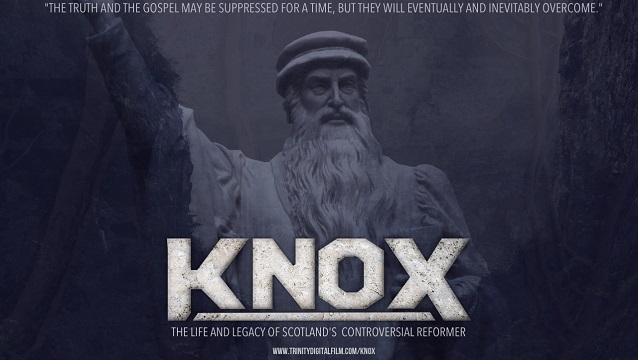Scotland's great Reformer: Who was John Knox?

A documentary about the Scottish reformer John Knox is up for a BAFTA Scotland New Talent Award next week.
Knox tells the story of one of Scotland's greatest figures. Presented by Philip Todd, it's directed by Murdo Macleod, who said: "It is very rare for an explicitly Christian film to achieve recognition in the mainstream industry, and we hope that this nomination will allow the Christian message that Knox preached to reach a wider contemporary audience in Scotland than just the church."
The film is making waves outside Scotland too. Knox is also nominated for best director, best documentary and most creative at the International Christian Film Festival 2016, to be held in Orlando, Florida at the end of this month.
But who was John Knox, and why should he be remembered?
1. He was a key figure in Scottish history
Knox founded the Church of Scotland and helped make Scotland a Protestant country. He led the Reformation in the country and is remembered for his uncompromising stand on the Word of God.
2. He was a man of action
Born perhaps in 1514, he studied theology at St Andrews and was ordained in 1536. The Reformation was gathering force on the Continent and Lutheran ideas were finding their way to Scotland. Knox accepted them in the early 1540s and became a bodyguard to George Wishart, a fiery Protestant preacher. The Catholic Cardinal Beaton had Wishart arrested and executed, whereupon a Protestant mob murdered him, with Knox's approval. After a siege of St Andrew's Castle he was sent to the galleys for 19 months.
3. He was a friend of John Calvin
He travelled to Geneva and learned much from the great Reformer, calling Geneva "the most perfect school of Christ that was ever on earth since the days of the apostles."
4. He advocated violent revolution
In Geneva he wrote fierce denunciations of his enemies. His Admonition to England condemned the English for allowing Catholicism back after Edward VI's death (under Mary Tudor, 'Bloody Mary'). In The First Blast of the Trumpet Against the Monstrous Regiment of Women he argued, like a 16th-century John Piper, that women shouldn't be queens with authority over men; his targets were Mary Tudor and Mary Queen of Scots, but he also offended the future Queen Elizabeth. In Appellations to the Nobility and Commonality of Scotland he said people should rebel against unjust rulers.
5. He was fervently anti-Catholic
Those were not good times for ecumenism. Knox returned to Scotland in 1559 and preached a violent sermon in Perth against Catholic 'idolatry'; a riot ensued. He was also a mighty preacher who would spend half an hour in calm exegesis then apply the text to Scotland's situation, whereupon he would pound his pulpit and terrify his hearers.
6. His influence was profound
After the Treaty of Berwick in 1560, the pro-Protestant English and the pro-Catholic French agreed to leave the country, with the Protestants in charge. Parliament ordered Knox and five others to write the foundational documents of the Church of Scotland, which was Calvinist in theology and Presbyterian in church order. It took years for this to be accepted, but Knox prevailed in the end.
7. He clashed with his Queen
On more than one occasion he crossed swords with Mary over her Catholicism and her personal life, on at least one occasion reducing her to tears. He said then: "Madam, in God's presence I speak: I never delighted in the weeping of any of God's creatures; yea I can scarcely well abide the tears of my own boys whom my own hand corrects, much less can I rejoice in your Majesty's weeping." This did not stop him calling for her death after she married the Earl of Bothwell, suspected of the murder of her husband Lord Darnley.
Knox is revered for his uncompromising faith, his courage and his personal integrity. He died in 1572, saying in his will: "None have I corrupted, none have I defrauded; merchandise have I not made." He was only interested in doing the will of God. At his graveside in Edinburgh's church of St Giles, James Douglas, fourth Earl of Morton and newly elected regent of Scotland, said: "Here lies one who never feared any flesh."
Follow Mark Woods on Twitter: @RevMarkWoods











